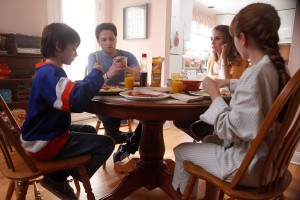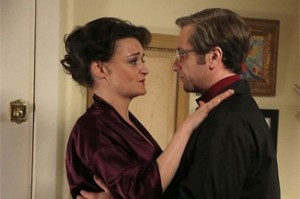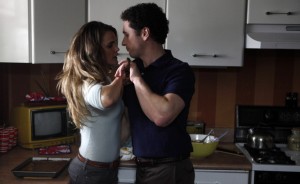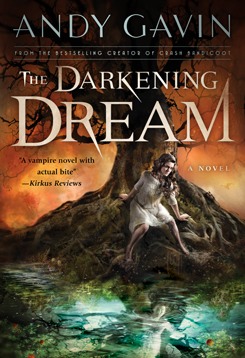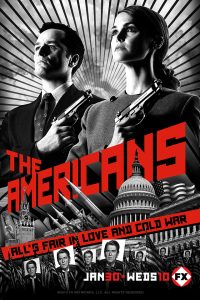 Title: The Americans
Title: The Americans
Genre: Spy Thriller
Watched: Late July, 2013
Summary: Homeland 1981
At one level, The Americans is Homeland 1981. And given how fantastic Homeland is, this isn’t all bad. The Americans isn’t quite so good, but it is very good television. And the setting resonates deeply with me. I grew up in Washington D.C., in this exact era. I’m exactly the age of their kids. The Reagan era costumes, cars, and politics are all highly nostalgic. Although I do have to say that this period feel is about 90% dead on, and about 10% off. The show is set in 1981, but they use songs that at least associate later. In the Air Tonight, for example, which is a favorite of mine. Technically, it is an 1980-81 song, and was a hit then, but I remember it better from the 1984 Miami Vice inspired return.
Where Homeland focuses on solo character, The Americans focuses on relationship. At the core of the show is this unusual marriage. They didn’t choose each other. They aren’t even technically married. The central couple were a pair of young KGB agents shoved in a room together and told to spend their lives pretending to be married. But so real is this act, so long have they slept in the same bed, shared the same work, cared for the same children, that the cover becomes the reality. Is this life any less real than any other? That dilemma, and the sympathy and interest forged from that central weirdity, is highly engaging.
Additionally, we have some great thrills. The twists and intrigues are solid and involve a bunch of interesting secondary characters, notably: the FBI agent across the street and the junior KGB officer with problems of her own. Keri Russell and Matthew Rhys are compelling as the leads, but Annet Mahendru as that double or triple agent girl is darn impressive (and sexy). Her arc shows this deadly game at its best and worst. One mistake (and who doesn’t have a few) opens her to that most difficult of choices: a tour in Siberia of heavy labor and gang rape or life as a traitor and double agent. There is no happy ending here. It’s how long can she play the game before the music stops and there are no more chairs.
The show gets deep and involved in the spycraft, and this is great. I spent some time digging as to the realism. Certainly the sheer volume and intensity of activity would be unprecedented. Mr. and Mrs. Jennings use disguises, surveillance, sex, and violence on a near daily basis. In real life, spycraft was much slower with a much greater differentiation between “agent” and “spy.” The spy is a traitor who has been bribed, coerced, or fooled into stealing information from their own side. The agent runs the spy. Here, the Jennings operate both as agents and as direct gatherers of information, which apparently didn’t happen much. But this is television. There is also a high body count, which was unusual. But the whole system is fascinating.
The show is edgy with regard to sexual content, but there is little or no nudity. It’s rarely if ever erotic. The Jennings both use sexuality as a primary weapon in the recruitment and coercion of their spies. In real life this was probably a blunter tool than the surgical scalpel we see here, but it does add an interesting complexity to their already byzantine marital life.
The Americans isn’t afraid to touch on complex areas, and this is part of what makes it a great show. It shows the basic level of misunderstanding between the two sides in the cold war. When Reagan is shot, the Russians view the progression of events in their own terms, failing to adequately understand the differences between Moscow and Washington. Can we blame them? All viewpoints are relative. Likewise, we bond with the central characters, their lives, and their dilemmas. Who are they? Are they traitors and killers? Are they husband and wife? Are they mother and father? Or are they all of the above?

